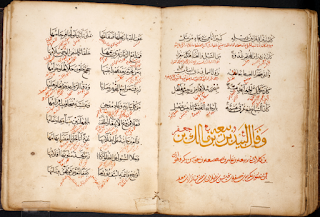Beauty of Arabic Poetry- Ode of Labid
Labīd (Abu Aqil Labīd ibn Rabī'ah) (Arabic لَبيد بن ربيعة بن مالك أبو عقيل العامِري) (c. 560 – c. 661) was an Arabian poet.
He belonged to the Bani Amir, a division of the tribe of the Hawazin. In his younger years he was an active warrior, and his verse is largely concerned with inter-tribal disputes. Later, he was sent by a sick uncle to get a remedy from Prophet Muhammad at Medina Peace and Blessing Be Upon him and on this occasion was much influenced by a part of the Quran. He accepted Islam soon after, but seems then to have ceased writing. In Umar's caliphate he is said to have settled in Kufa. Tradition ascribes to him a long life, but dates given are uncertain and contradictory. One of his poems is contained in the Mu'allaqat.
His muruwwa (virtue) is highlighted in the story that he vowed to feed people whenever the east wind began to blow, and to continue so doing until it stopped. Al-Walid 'Uqba, leader of the Kuffa, sent him one hundred camels to enable him to keep his vow.
In an elegy composed for Nu'mh Mundhii, Labid wrote:
- Every thing, but Allah, is vain
- And all happiness, unconditionally, will vanish
- When a man is on a night journey, he thinks that he has accomplished some deed
- But man spends his life in hopes
- ...
- If you do not trust your self, approve it
- Perhaps the past would unclose it to you
- When you do not find a father other than 'Adah and Ma'iid,
- The judge (God) will punish you
- On the day when every body will be informed of his deeds
- When the record of his life is opened before Allah'
- Source: Wikipedia


Comments